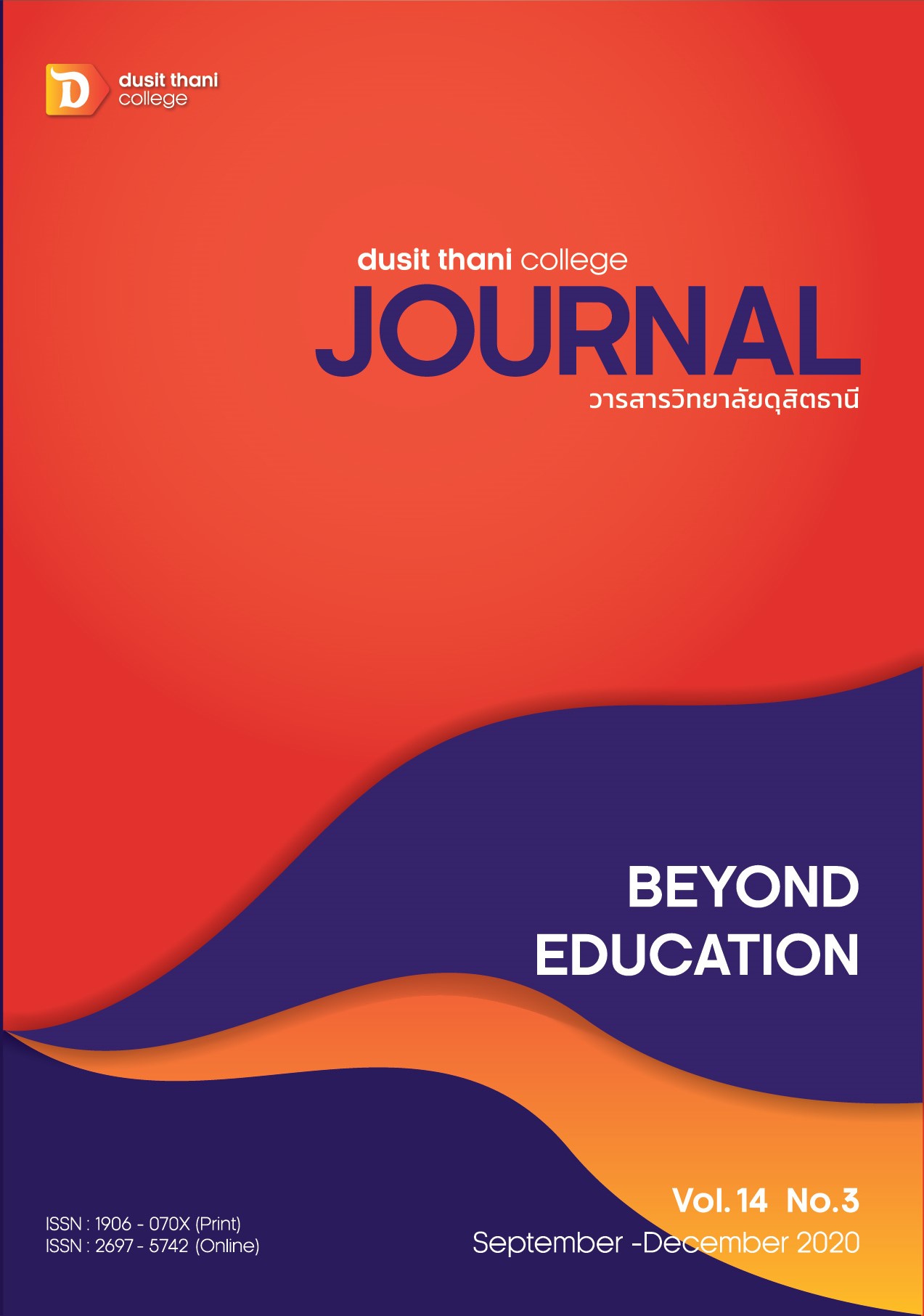Community-Based Participation in Cultural Tourism Management in Bo Suak Sub-District, Muang District, Nan Province
Main Article Content
Abstract
Based on the quantitative research, the main purpose of this dissertation aimed to investigate the levels of communities’ participation in cultural tourism management in Bo Souk sub-district, Muang district, Nan province. For research methodology, an interviewed questionnaire was conducted with 17 inhabitants living in Bo Souk sub-district, Muang district, Nan province. The findings of the study revealed that the numbers of female informants (75%) with their age of 50-99 (62.50%), their married status (75%), their primary educational backgrounds of (50%), their farming work (75%), as well as their income of less than 5,000 baht were mostly found in terms of demographical information. In addition, the communities’ participation in cultural tourism management in Bo Souk sub-district, Muang district, Nan province with its mean of 2.98 was very mostly found, followed by their final decision with its mean of 2.82, and their beneficiaries and evaluation follow-ups with its mean of 2.69. As a result, the community dwellers’ pride of tourism resources together with the importance of tourism upgraded for their better ways of life directly led to the communities’ required tourism management.
Article Details
Article Screening Policy
- All research and academic articles to be published must be considered and screened by three peer reviews in the relevant field / article.
- All articles, texts, illustrations and tables published in the journal are the personal opinions of the authors. Editors don't always have to agree. And no responsibility whatsoever is the sole responsibility of the author.
- The articles to be published must never be published. Where did you first publish? And not in the consideration of other journals If the audit found that there has been a duplicate publication It is the sole responsibility of the author.
- Any article that the reader sees as being plagiarized or impersonated without reference. Or mislead the work of the author Please let the journal editor know it will be your greatest blessing.
References
Bangkok : King Prajadhipok's Institute.
Chanwit Kasetsiri. (1997). Thai Ways of Life : Cultural Tourism. Bangkok : Umarin Printing and Publishing Co, Ltd.
Chaisanun Sompunyathiwong, Ueongprai Wanlaphachai. (2016). A study of Preparation for
Hmong Ethnical Group’s Cultural Tourism in toob kho village, Kok Saton Sub-district, Loei Province. Humanities & Social Sciences Research Journal of Western University.
Chaiyasit Damrongwongchareon. (1997). Preservative Cultural Tourism Management
Based on Community Participation : A Case Study of Phu Pha Yon, Phu Phan District, Sakon Nakon Province. (M.A. Thesis : Mahasarakam University).
Chintawee Kasemsuk. (2011). Communication and Social Changes. Bangkok :
Chulalongkorn University.
Chompunoot Panupat, Tepprasit Guithawatvichai, Sombat Karnjanakit. (2019). The Development Guideline for Cultural tourism of Thai Ethnic Group: A Case of Thai-Puan Community. PSAKU International Journal of Interdisciplinary Research 8(1) (January – June 2019).
Kirshenblatt-Gimblett, B. 2004. “Intangible Heritage as Metacultural Production.”
Museum International 56(1-2): 52-56.
Malinee Winzen. (2010). Communities’ Participation in Phu Kaset Tourism Resources
Development : A Case Study of Nong Hai Sub-district, Senangnikhom District, Amnatchareon Province. (M.A. Thesis). Ubhonratthani Rajabhat University.
Mowfort, M. & Munt, I. 2016 Tourism and sustainability: Development,
globalization and new tourism in the third world. 4ed. London: Routledge.
Namchai thanuphon, Danuwat Peng-Oun, & Manus Sawaluck. (2000). The Development of
Eco-Tourism Management in Pong Village, Pa Phai Sub-district, Sansai District, Chiangmai Province. Faculty of Business Agriculture. Mae Jo University.
Niparat Saiprasert. (2010). The Development of Community-Based Tourism management in Haui Sat Yai Sub-district, Hua hin district, Prachubkhereekhun Province :
(Ph.D Thesis, Faculty of Tourism Development. Maejo University).
Nutchanart Rattanasuwongchai. A Proceeding on “Anthropology in the New Century :
Dynamics on Knowledge and Multicultural Identities” Held on August 18th – 19th, 2011, at Wachirawut Building, Kasetsart University.
Nzama, A.T, Magi, L.M., & Ngocoho, N.R. (2005). Workbook-I Tourism Workbook for Educators: 2004 Curriculum Statement (Unpublished Tourism Workshop Educational Materials). Centre for Recreation & Tourism, UZ. And Tourism Kwazulu-Natal, University of Zululand.
Phusawat Sukliang. (2002). Concepts on Cultural Tourism Management. Bangkok :
Tourism Authority of Thailand.
Pornchai Saksirisophon. (2012). A Model of Parties’ Participation in Organizing Bhuddha
Lyric’s “Hae Pha Khuen That Festival in Nakhon Srithammarat Province, Dissertation. (Ph.D. Thesis). Faculty of Tourism Development. Mahasarakham University).
Rasika Ungkul, Nuanla-or Saengsuk, Warachai Inthra Naknan. (2004). The Development of
Potentialities in Cultural Tourism and Local Wisdoms. Bangkok : Ramkhamhaeng
University.
Sayun Paichanchit. (2014). Recoveries on Community Power Based on Archaeological
Resources and Museum Management : Concept, Approaches, and Expereinces in Nan Province. (1st Ed.). Bangkok : Thammasart University.
Siri Hamsupoh. (2002). Tourism Sociology. Bangkok : O.S. Printing House.
Sin Sarobhon. (2003). Community-Based Tourism Concepts and Experiences in
Northern Thailand. Chiangmai : Chiangmai university.
Smith, Melanie K. 2009. Issues in Cultural Tourism Studies. 2nded. New York: Routledge.
Somsak Srisantisuk. (2003). Socio-Cultural Changes : Guidelines for Analysis and
Planning. Khonkaen : Klangnanawittaya.
Sudthanom Tunchareon. (2015). Perspectives on Cultural Tourism and Community
Participation. National Conference on Southeast Asian Interdisciplinary Studies held
on June 28th, 2015, at S.D. Avenue Hotel. Pinklao Bangkok.
Thanarat Rattanapongtham, Chongwit Chareonthanalab, & Tharnnee Nawatnathee. (2017).
Communities’ Participation in Preservative Community-Based Tourism Development in Phranakon Sriayutthaya Province. Academic Journal of Social Communicative Innovations, 2(100), 8-16.
Wanna Wongwanich. (2003). Tourism Geography. Bangkok : Thammasart University.
World Tourism Organization, 2010 Arrivals of non resident tourists/visitors,
departures and tourism. Retrieved on July 15, 2013.
Yutthakarn Wai-arpha. (2010). The Development of Community-Based Tourism
Management in Sob Win Village, Mae Win Sub-district, Mae Wang District, Chiangmai Province. (Ph.D. Thesis). Faculty of Tourism Development. Mae Jo University.


